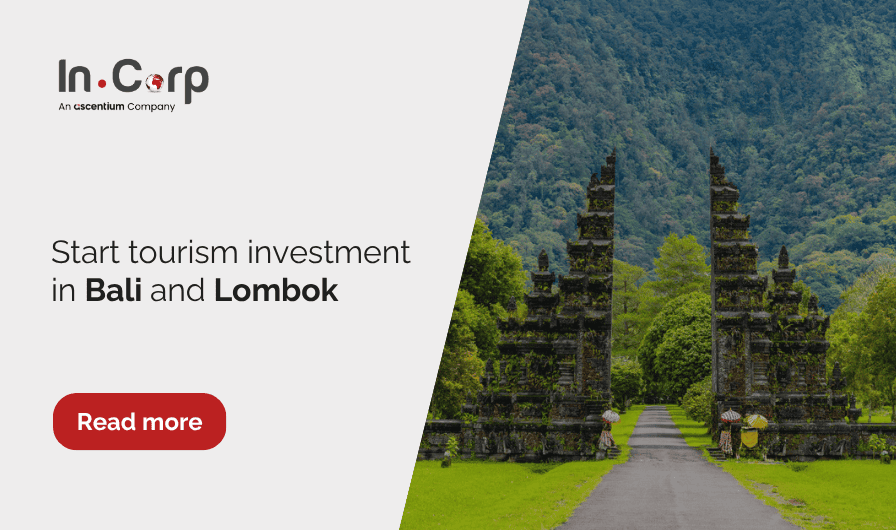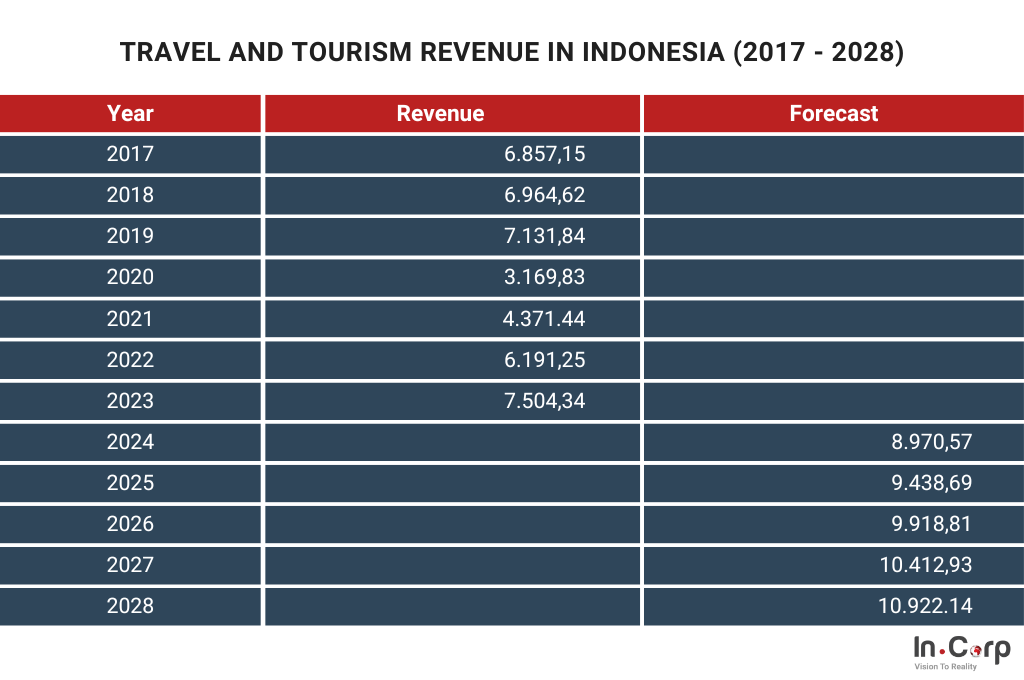Making a tourism investment in Lombok, Bali, and other Indonesian islands is a well-established choice for foreign investors. The allure lies in their immense growth potential and the remarkable resilience of their tourism sectors in recovering from adversity.
This article explores the recent developments, facts, and figures that make these destinations promising for foreign investments.
The Importance of Tourism Investment in Indonesia
Tourism investment contributes significantly to foreign exchange earnings, boosts government revenue through taxes, and promotes international cooperation and cultural exchange.
Indonesia’s tourism investment also presents a myriad of opportunities, here are the reasons why:
1. Lucrative Market
Indonesia’s tourism has been successfully maintaining the number of foreign and domestic tourists running each year, which shows opportunities to step into the tourism sector.
2. Supporting the Locals
The growth of the tourism sector invites the locals or businesses to have a larger market, providing new job opportunities, reviving the local culture, etc.
3. Government Incentives
The Indonesian government offers various incentives and support mechanisms to encourage tourism investment, such as tax incentives, infrastructure development grants, and streamlined regulatory processes. The advantage of these incentives is to reduce costs and accelerate their investment plans.
4. Sustainable Development
Responsible tourism investment promotes sustainable development practices that minimize environmental impact, preserve cultural heritage, and benefit local communities. Businesses that prioritize sustainability can attract eco-conscious travelers and differentiate themselves in the market.
By prioritizing tourism investment, Indonesia can harness its vast potential as a premier tourist destination, ultimately contributing to the nation’s socio-economic prosperity and global competitiveness.
How Profitable is Tourism in Indonesia
Tourism investment has played a pivotal role in driving Indonesia’s economic growth for the past years. In 2022, the tourism sector managed to reach 5,5 million foreign tourist arrivals and reached 703 million domestic tourists. The tourism sector has been contributing to GDP by up to 4,1%.
In 2023, both domestic and international tourists have risen to 12,57% from the previous year. These numbers give a solid promise of profit from the tourism investment.
Indonesia’s Tourism Sectors Expected to Grow
After the relaxation of the COVID-19 restrictions, the tourism sector in Indonesia has shown improvement compared to the last few years of the pandemic. International visitors in September 2023 increased by 143.41% compared to 2022 and Ngurah Rai Airport-Bali is one of the main airports that contributed to the increase in 2023 by 230,12% compared to 2022.
Based on the history of Indonesia’s tourism ‘comeback’, the market is expected to generate a revenue of up to USD 8,971 for the year 2024. The annual growth of the tourism market is forecasted to be at a rate of 5,04% (2024-2028).
Areas to Improve for Tourism Investment in Indonesia
Even though Indonesia’s Tourism sector has shown its performance, there is still room for improvement, as follows:
1. Quality Destinations
Indonesia can improve its tourism sector by enhancing the quality of tourist destinations, such as beaches, national parks, and cultural sites. This involves upgrading infrastructure, facilities, and services to meet international standards and diversifying offerings to attract more visitors.
2. Technology Innovation
Embracing technology innovation can optimize the visitor experience and operational efficiency in Indonesia’s tourism industry. This includes developing digital platforms, mobile apps, and smart solutions to streamline booking processes, offer personalized recommendations, and improve sustainability practices.
Bali’s Rapid Recovery
Bali’s tourism industry faced a significant setback in November 2017 when Mount Agung showed signs of eruption. Inbound traffic temporarily declined, but the island quickly bounced back. Within three months, it experienced an astonishing recovery of over 90%, attracting a daily average of 14,000 visitors.
Bali’s ability to weather the storm during the 1998 financial crisis, with minimal impact compared to other regions, can be attributed to the devaluated Indonesian Rupiah, which acted as a catalyst in sustaining the tourism industry.
ADR Advantage in Bali
While the COVID-19 pandemic affected the global tourism sector, Bali’s hotels and accommodations could rely on their Average Daily Rate (ADR) to sustain business. In March 2020, the South Pacific region witnessed a 10% drop in hotel ADR.
However, Bali’s ADR remained strong, surpassing the national average by 91% in 2020. This resilience underscores the market’s stability and potential for long-term returns on tourism investment.
Steps towards Recovery
To revitalize the tourism industry, Indonesia has implemented various measures. Accelerated vaccine drives and negotiations with countries like Singapore, China, South Korea, India, the Netherlands, United Arab Emirates, Ukraine, and Poland for potential travel bubbles show the government’s commitment to restoring tourism.
Recognizing the need to diversify beyond Bali, the government has introduced the “10 New Bali” initiative, focusing on ten priority destinations. One such gem is Mandalika, located on the nearby island of Lombok.
Mandalika: The Next Bali
In 2017, President Joko Widodo declared Mandalika a priority destination, leading to accelerated development efforts in Lombok. The ambitious Mandalika Development Project, with a whopping investment of US$3 billion, aims to establish more than 16,000 hotel rooms, a waterpark, a 27-hole golf course, 1,500 villas, and a 4.3km International Race Circuit.
The forthcoming Integrated Tourist Master Plan (RIPT) for Lombok Island further emphasizes the government’s commitment to developing a resilient, inclusive, and sustainable tourism ecosystem. This plan encompasses improved connectivity, preservation of cultural diversity, and enhanced tourist facilities.
SEZ Incentives in Mandalika
Mandalika’s inclusion in the Special Economic Zone (SEZ) list brings a host of incentives that make it an enticing investment opportunity for foreign investors. With projections indicating a surge in tourist arrivals from 2.4 million in 2018 to an estimated 12 million by 2045, Lombok Island is poised to become a world-class tourism destination.
For investors contemplating business ventures in Bali or Mandalika, it is crucial to grasp these locations’ key differences and immense growth potential.
Ensuring Compliance with the Company Regulations
Venturing into foreign markets can be challenging due to unfamiliar business nuances and legal requirements. Foreign investors seeking to establish a business in Lombok must navigate the Indonesian Company Regulations. To alleviate these challenges, InCorp Indonesia offers comprehensive business solutions tailored to investors’ needs.
Their services, including accounting, tax reporting, and legal guidance, ensure compliance with Indonesian regulations and facilitate a seamless investment process.
Conclusion
Investing in Lombok, Bali, and other Indonesian islands presents a lucrative opportunity for foreign investors. The demonstrated resilience of Bali’s tourism sector, combined with the government’s initiatives to drive recovery and develop new destinations like Mandalika, sets the stage for promising returns on investment.
Investors can confidently navigate the Indonesian business landscape by leveraging the expertise of business solutions providers like InCorp Indonesia. Seize the opportunity to be part of Indonesia’s thriving tourism industry and unlock the full potential of these enchanting islands.
Make the Most Profit Out of Your Tourism Investment Fund
Ready to elevate your tourism investment strategy? Let our expert team guide you towards success. With tailored solutions, in-depth market insights, and a proven track record, we’re here to help you maximize your returns and make a lasting impact in the tourism industry.
Partner with us today and unlock the full potential of your investment portfolio. Get started now and embark on a journey to the best tourism investment value.
Get in touch with us.
What you'll get
A prompt response to your inquiry
Knowledge for doing business from local experts
Ongoing support for your business
Disclaimer
The information is provided by PT. Cekindo Business International (“InCorp Indonesia/ we”) for general purpose only and we make no representations or warranties of any kind.
We do not act as an authorized government or non-government provider for official documents and services, which is issued by the Government of the Republic of Indonesia or its appointed officials. We do not promote any official government document or services of the Government of the Republic of Indonesia, including but not limited to, business identifiers, health and welfare assistance programs and benefits, unclaimed tax rebate, electronic travel visa and authorization, passports in this website.




